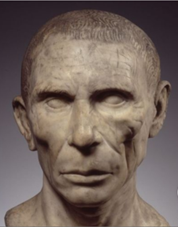Exorcism of a Colleague

Craig is not his real name. I chose this pseudonym for reasons that should become apparent as this sketch progresses.
I worked with Craig for a brief time, decades ago. He did not report to me, nor I to him. We were “colleagues”, peers reporting to the same higher manager.
Never have I forgotten him. I did not like him. Perhaps I disliked him. But for reasons to this day unfathomable, I craved his approval and even, in giddier moments, aspired to attain his respect — even friendship.
Like “Craig”, his real name had one syllable, a name that could not be casually changed into a nickname such as “Johnny” or “Billy”. It was one of those hypermasculine names that brooked no intimacy or casual camaraderie.
Perhaps in his forties, or fifties, or maybe an extremely limber sixty-year-old, he seemed ageless. Tall, trim, neat, close-cropped hair, no beard or moustache; all his features appeared sculpted. His clothing tended to dark browns, neither casual nor formal, neither fashionable nor outdated. Nondescript yet professional. Brown shoes with soft rubber soles. You never heard him coming.
When he spoke, which was seldom, his voice was deep but not startlingly so. Perhaps a touch raspy from lack of use or perhaps a bit twangy like the lower notes of a rusty harp.
Was he married? I have no idea. Was he university educated? Again, no idea. Did he have hobbies, did he like to read, did he have a favourite television show, a movie he enjoyed? Did he have children or grandchildren? He spoke unaccented English, so he was likely raised in the United States or Canada, but I do not know for sure. Did he have friends, did he go out for dinner at French restaurants, did he like pizza, did he dote on his pet parakeet? I have absolutely no idea.
His office was clean and neat. Shelves precisely ordered, file cabinets always closed and locked, his desk with only a phone and a computer monitor on it. A few papers pertaining to whatever he was working on at that moment would be in front of him. Pens, pencils, markers, paper clips were nowhere to be seen. No photographs of family, no motivational posters. There was a framed picture of some neutral nature scene on the wall, but that came with the office furnishings, much like something one would find at a moderately upscale hotel.
I can’t recall whether he ever laughed or truly smiled. He did have something of a grimace or an approximation of a smile when something may have quietly amused him, but he never revealed what induced his face to briefly change form from its bland stone-like visage. He did, very occasionally, have a visceral grunt that one might presume was a laugh.
Some people truly hemorrhage personal information at work: they volunteer the places they’ve been, the books they’ve read, the movie they saw last week, the meal they ate. Their verbal geysers cannot be capped, spouting all manner of content, over-eagerly seeking an appreciative audience. Craig never, ever divulged anything of the sort to me, or to anyone else as far as I knew.
I recall him only occasionally using an adjective and almost never an adverb. What adjectives he did use would be concrete — black, white, good, bad, right, wrong, efficient, fast, slow — but nothing particularly descriptive and certainly not metaphorical. Craig’s verbal scenery was a sparse vista of nouns and verbs. It was almost as though he had a daily word quota that must not be exceeded. It felt like a judgment; was speaking to me akin to squandering his daily word limit?
Most conversations have something of a texture, but this was absent with Craig. It was off-putting to face someone who clearly didn’t care what you thought or did, and wasn’t in the least affected by your actions. To borrow an expression coined by someone else, “a circle looks at a square and sees a badly made circle”. In my interactions with Craig, I was an exceedingly awkward circle.
In the 1998 movie “Soldier”, Kurt Russell spoke a total of only 104 words in the entirety of the 99-minute run time — this despite his being in 85% of the scenes. The story was set in an unstated future time, when a group of orphaned infants were selected shortly after birth to be raised as highly disciplined soldiers with no understanding of anything but military routine. They were trained to be ruthless professionals, they were turned into ultimate fighting machines, but had no understanding of the outside non-military world. Craig reminded me of the Kurt Russell character.
According to the National Center for Voice and Speech, the average person utters around 150 words per minute. While the actual word count is unique to everyone, it matters if you're just having a normal conversation or giving a presentation of some kind. Still, most people clock around 150 words per minute in normal conversation. On the chattier end, someone might reach 180.
What few words Craig spoke gave the impression of being brittle things, ancient and dry, like twigs. His voice carried no inflection, no emotion, no enthusiasm. It seemed as though he was deciding whether the person he was addressing was worth the expenditure of his word rationing, and usually fell short.
His lips were harsh and narrow, his gaze mirthless. When listening to me talking, he never raised an eyebrow in acknowledgement of what I was saying, his face like desiccated and chiselled parchment overlaid on an expressionless egg.
But, occasionally, in vanishing rare moments, a twinge of what might be interpreted as pleasure would briefly cross his face. In those moments, I felt an inordinate vindication, as though I had been a miserable dog waiting endlessly at what appeared to be an abandoned rathole only to discern a faint rustle of life within.
I never had the faintest understanding of Craig, and even less so of my inexplicable desire to please him. Perhaps there was a schism between the perceived banality of everyday speech vs originality or significance of one's thoughts. And, because of how he seldom spoke, did we all assign his few utterances with more significance than deserved?
Most of the time, not only were words at a minimum; glances were not wasted — although he would occasionally beam out a long-suffering look, as one might let slip with a slow student in a remedial class. One sensed an underlying casual cruelty accompanying his doomed-to-be-disappointed expectation of high performance. His standards appeared unreachable.
Yet I talked to the man and most of my words were like flippant skittering stones tossed across a still, dark lake, destined to sink meaninglessly to the bottom.
The name Craig derives from “crag”, meaning a steep rocky cliff or a part of a mountain. Hence, the pseudonym “Craig”. In my mind Craig was a living representation of metamorphic rock, the hardest of all three types (metamorphic, igneous and sedimentary). It is extremely hard because long periods of heat and pressure cause a realignment of the crystals and minerals it contains.
But I digress, and Craig would definitely not approve.
I read somewhere that in order to analyze something, that something must agree to be analyzed. I never received that permission.
Still, he has remained in my mind for decades. Perhaps this writing will finally exorcise him.
Would you like to read other posts? If so, please click the Home Page link below:

You, Dear Reader, are much needed and appreciated.
Everything written requires a reader to make it whole. The writer begins, then you, dear reader, take in the idea and its image, and so become the continuation of its breath. Please subscribe so that my words can breathe. Consider this my hand, reaching out to yours.
